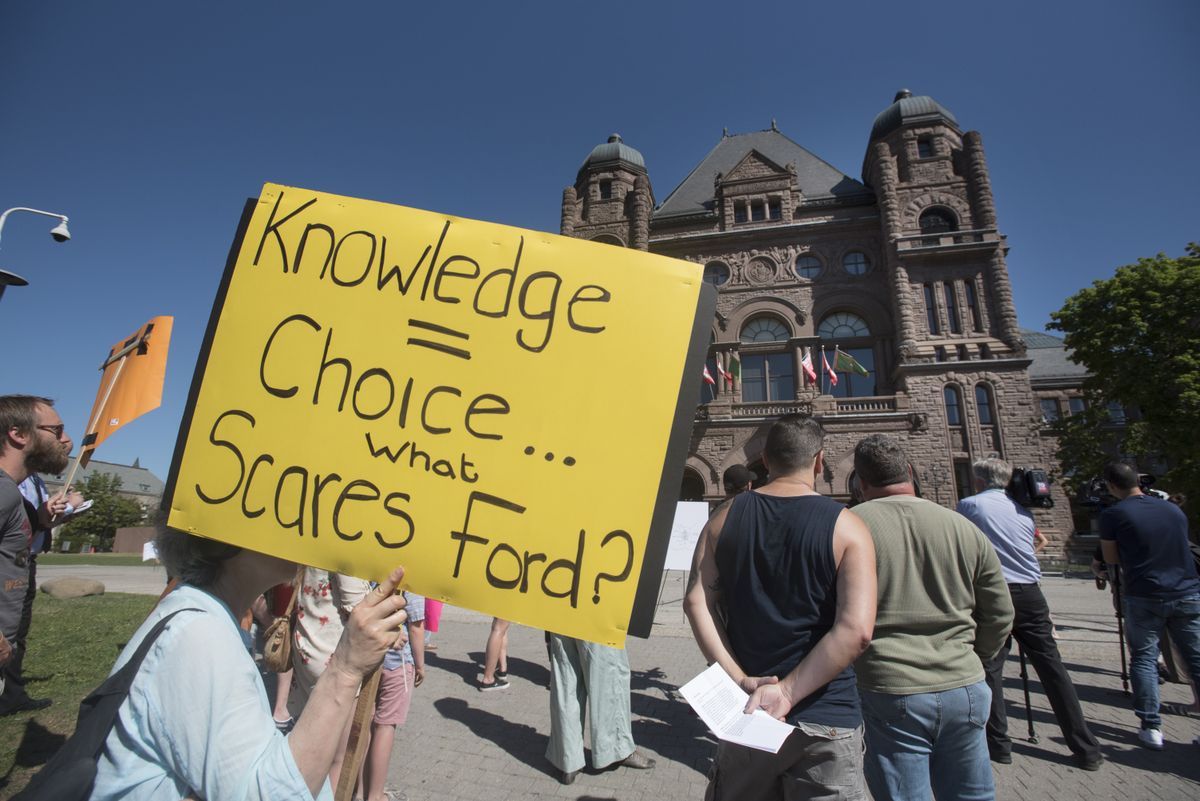Ontario Premier Doug Ford’s much-repeated campaign promise that he would consult widely on rewriting the sex-education curriculum has now expanded into a sweeping rethink of the province’s education system of which sex ed will only be a small part.
The government will solicit input on a number of other areas including math scores, legalization of cannabis, standardized testing and cellphone bans in schools.
As part of his announcement, Mr. Ford also threatened to discipline educators who defy his government’s orders to use a 20-year-old sex-education curriculum and he launched a platform for parents to anonymously report concerns on what is being taught in classrooms.
“We will not tolerate anybody using our children as pawns for grandstanding and political games. And, make no mistake, if we find somebody failing to do their job, we will act,” Mr. Ford said in a statement.
Mr. Ford, who criticized the previous Liberal government for not consulting enough on the sex-ed curriculum, had vowed that his government would go to all 124 provincial ridings and conduct the “largest consultation ever in Ontario’s history when it comes to education.”
But Wednesday’s announcement said only that the government would conduct an online survey and telephone town halls in “every region of Ontario.” A spokeswoman for Education Minister Lisa Thompson would not explain whether the town halls would be open to all Ontarians or whether the government would call a random sample of people in each region. The ministry also would not comment on whether the government would maintain the Progressive Conservative promise to go to each of Ontario’s riding.
Mr. Ford’s stark warning to educators came after two of the largest teachers’ unions in the province said in recent weeks they would defend educators who continue to use the now-scraped version of the sex-ed curriculum that was updated by the previous Liberal government in 2015 and included topics such as consent, gender identity and the dangers of sexting. Several school boards have also issued statements over the summer that important and relevant sex-ed lessons will be included in classroom instruction regardless of which curriculum is in place.
A school board could impose penalties on a teacher that would escalate from a verbal or a written warning to a suspension and termination. A complaint could also go to the Ontario College of Teachers, which licenses, regulates and disciplines teachers.

Around 50 gathered outside the Ontario Legislature on July 18, 2018, to protest the Ontario government’s plan to roll back the current sex-ed curriculum and go back to the 1998 version. FRED LUM/THE GLOBE AND MAIL
By scrapping the updated sex-ed curriculum in the elementary-school years, Mr. Ford is fulfilling a campaign promise (the government said it was not making any changes to the modernized high-school curriculum). Some parents and groups, especially social conservatives, had labelled it age-inappropriate for young children, zeroing in on its lessons on gender identity and same-sex marriage.
For the coming school year, the government said, teachers are expected to use a “revised interim curriculum,” which is based on the old health and physical education document taught between 1998 and 2015. It includes the 1998 document on sexual health. Gender identity is mentioned in the introduction and the glossary, but consent and sexting is no longer discussed in Grade 7 and the curriculum doesn’t include topics of gender identity and sexual orientation in Grade 3.
New Democrat Leader Andrea Horwath said she did not support the Ford government’s move to not include consent, LGBTQ issues or gender identity in the sex-ed curriculum.
“Dragging health education backwards by a generation while threatening Ontario’s world-class educators for trying to do their jobs will only undermine our education system and hurt our young people,” she said in a statement.
The Official Opposition Leader also charged that Mr. Ford was only rewriting the curriculum to “appease a vocal minority of radical social conservatives.”
Tanya Granic Allen, who ran for the PC Party leadership earlier this year and who has been a vocal opponent of the 2015 sex-ed curriculum, said that parents still need clarity from the government that gender identity won’t be taught. Still, she said, “I’m glad that the Doug Ford government is listening now, listening to parents.”
In a document published on Wednesday, the education ministry said that any parent who believes a teacher “is jeopardizing their child’s education by deliberately ignoring Ontario’s curriculum” should call the Ontario College of Teachers or file a complaint online. The government also launched a website for parents to anonymously disclose their worries about the curriculum being taught in their children’s schools. The information would be shared with the OCT, the government said.
Complaints on how the curriculum is taught have typically been referred to the school board, a teacher’s employer, and it is unusual for the ministry to get involved.
Harvey Bischof, president of the Ontario Secondary School Teachers’ Federation, said it was “unprecedented in this province that a curriculum release would be accompanied by an implicit threat of discipline” and that he was “disturbed by an apparent effort by the government to turn classrooms into an ideological battleground.”
Sam Hammond, president of the Elementary Teachers’ Federation of Ontario, said the Ford government is creating chaos in the province’s education system. “Having a Ministry of Education snitch line that bypasses the systems already in place to deal with issues at the school level will prohibit parents and educators from addressing classroom concerns constructively,” he said.
Speaking to reporters in Calgary, Alberta Education Minister David Eggen weighed in on the changes in Ontario and labelled it a “gong show.”
Mr. Eggen, speaking in the context of a continuing curriculum review by his NDP government, seized on what he called the Ford government’s plans for “hot-tip line for parents to report on teachers” as an example of politicians trying to sow divisions for their own political ends.
CAROLINE ALPHONSO, EDUCATION REPORTER
JUSTIN GIOVANNETTI
The Globe and Mail, August 22, 2018
